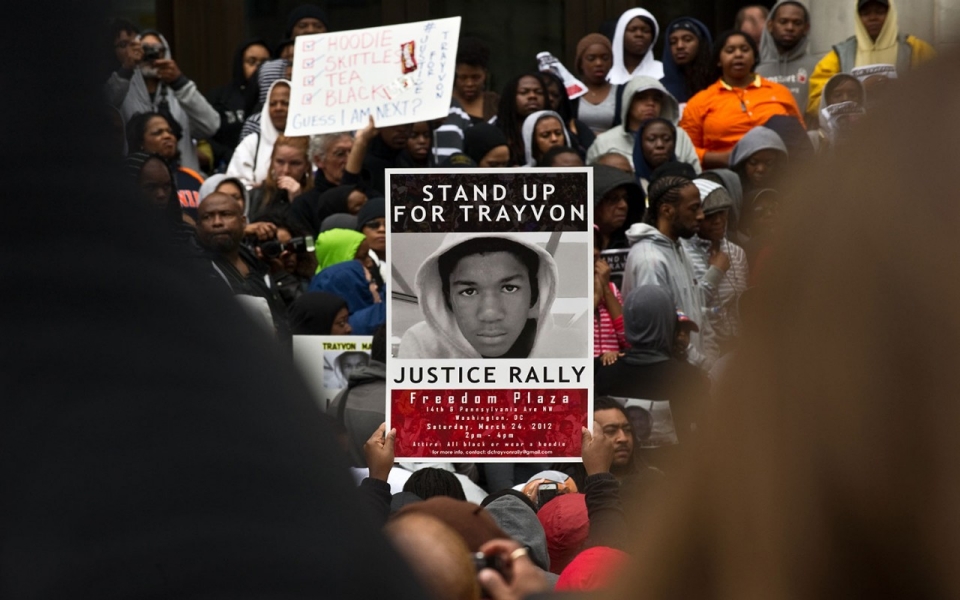
Almost a month after neighborhood watch volunteer George Zimmerman was acquitted in Florida of all charges in the February 2012 shooting death of unarmed black teenager Trayvon Martin, the debate about race and gun laws -- sparked by Zimmerman's closely watched trial -- persists. Americans have paid particular attention to the controversial "stand your ground" law, which was a focal point during the lead up to the Zimmerman trial, though his lawyers did not use it as their defense.
In Florida, "stand your ground" allows people to use deadly force to protect themselves, in public or in their homes, if they feel their lives are in danger.
Nowhere has the law and Trayvon Martin's death become more of a flashpoint than in Florida, where members of the social activism group Dream Defenders have been staging a sit-in outside the office of Gov. Rick Scott (R) since three days after the Zimmerman verdict. The group says it will stay "as long as it takes" to make the governor convene a special session of the legislature to enact "Trayvon's law," a bill that would repeal "stand your ground," and address other issues that disproportionately affect African Americans and Latinos.
While Martin's death brought Florida's "stand your ground" law into the spotlight, Florida isn't the only state with such legislation on its books. More than 30 others have some form of the law.
And according to a recent Quinnipac University poll, 53 percent of American voters support the laws, including 57 percent of white voters. Fifty-seven percent of African American voters oppose the laws. "Stand your ground laws" also have the fervent support of the National Rifle Association through its Institute for Legislative Action.
Gathered together, the data suggests that it could be an uphill battle to get "stand your ground" laws repealed anywhere in the country. In Florida, both Gov. Scott and the Republican-controlled legislature are staunch supporters of the law. Nevertheless, the Dream Defenders have gotten some response to their sit-in.
The governor at one point sat down with the group for an hour, according to The New York Times, after Scott initially ignored their protests. Since that meeting big-name supporters like Rev. Jesse Jackson and Harry Belafonte have championed the Dream Defenders' cause.
Ahmad Abuznaid, the legal and political director of Dream Defenders told Al Jazeera that repealing the law in Florida is a matter of safety -- an argument that supporters of the law would likely also use.
"We want 'stand your ground' to be repealed or reformed in a manner that makes us safer," Ahmad Abuznaid, the legal and political director of Dream Defenders, told Al Jazeera. "Our job is to fight for these causes and not just for the remembrance of Trayvon Martin or Jordan Davis. As each day goes by we are losing young black and brown lives in this state. The story of Jordan Davis, of Trayvon Martin is a daily reality for us."
Jordan Davis, another unarmed black 17-year-old, was shot to death in November 2012 by Michael Dunn, 46, in a Florida gas station parking lot. The shooting occurred after an argument over loud music coming from Davis' car.
Dunn, a white man, parked next to Davis and complained about the music. He told police he thought he saw a gun and fired eight or nine shots into Davis' car before speeding off.
Dunn has been charged with first degree murder in Davis' death and an additional three counts of attempted murder for shooting at the other victims in the car who survived. The trial is scheduled to begin on Sept. 23.
U.S. Attorney General Eric Holder weighed in on the laws during the annual NAACP convention in July, calling for a national review of all such gun legislation.
"Separate and apart from the case that has drawn the nation's attention, it's time to question laws that senselessly expand the concept of self-defense and sow dangerous conflict in our neighborhoods," Holder said.
And in the media world, Ebony Magazine used its September issue, often the month major magazines dedicate to fashion, as a tribute to Trayvon Martin. One of the issue's four cover displays a picture of Martin's parents. The three other covers separately feature photos of actor Boris Kodjoe, basketball player Dwayne Wade and director Spike Lee, all posing with their sons wearing gray hoodies. The cover line on each reads, "We are Trayvon." Trayvon Martin was wearing a hoodie the rainy February night he was killed.
Ebony, a staple publication in the black community, also calls for the repeal of "stand your ground" on the cover of the issue, which has generated both praise and criticism.
With those bold statements as their backdrop, the Dream Defenders are determined to stay the course.
"We need to hold our leadership more accountable," Abuznaid told Al Jazeera. "It's important for us to keep the message going on the broader and systemic issues our communities face."






Error
Sorry, your comment was not saved due to a technical problem. Please try again later or using a different browser.